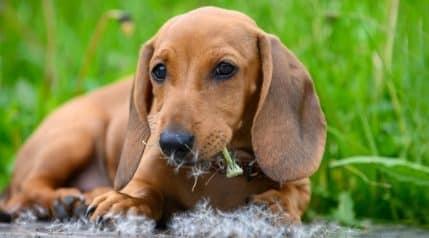If your dog tends to nibble on plants and flowers in your garden or even inside your home, it is important to check that they are non-toxic. Most dogs will ignore greenery, but some dogs are too inquisitive for their own good!
Puppies and young dogs, in particular, are more likely to experiment with eating various things they shouldn’t. In my experience, puppies are more likely to eat plants (amongst other things they shouldn’t!) than adult dogs. But it’s still sensible to take precautions to prevent older dogs from accessing potentially toxic plants.
Hibiscus plants are commonly found in gardens throughout the world. One species, in particular, could be moderately toxic to your pet. Let’s find out which species that is and when it’s time to contact your veterinarian.
What Is A Hibiscus Plant?

There are several hundred species of hibiscus. The most commonly grown species is Hibiscus syriacus, the common garden hibiscus, otherwise known as Rose of Sharon. Confusingly, there is also an unrelated plant called St John’s Wort. This plant is also sometimes referred to as Rose of Sharon.
The common garden hibiscus is a shrub with large trumpet-shaped flowers. They are usually pink but can also be white or purple. Hibiscus plants usually flower at the end of summer. They can grow to be very tall, sometimes up to 12 feet in height.
Is Hibiscus Poisonous To Dogs?

Similar to Petunias, and cosmos plants, most hibiscus plants are not toxic to dogs. But there are a few species that could be harmful if eaten, including the Rose of Sharon. As there are so many different species of hibiscus, all varying in appearance, it is best to treat any hibiscus plant as though it is toxic to your pet. Unless, of course, you are certain you know the species is safe.
The roots of many hibiscus plants are toxic. Even if the plant itself isn’t. There is very little known about the toxic properties of hibiscus. But, it’s thought that all parts of the plant, flower, and root can cause poisoning. Toxicity in dogs appears to be rare. There are only a few reported cases of known hibiscus poisonings.
Gut Upset
Bear in mind that even if your dog eats a non-toxic species of hibiscus, there is still a risk he could become sick. All plants contain a lot of fiber, and if your pup eats too much greenery of any kind, there is a risk the extra fiber could cause a nasty tummy upset, which usually means vomiting or diarrhea, or both.
Herbicides And Pesticides
There is also a risk that any plant Fido eats could have been treated with poisonous chemicals such as herbicides or pesticides. When used at the correct concentration, it is unlikely these will have any toxic effects. However, it is still sensible to err on the side of caution and prevent your canine companion from eating any plants that could have been contaminated with chemicals.
Allergies
As with anything that your pup eats, there is a small risk that he might be allergic to hibiscus. An allergic reaction could present as anything from a mild case of skin hives to anaphylaxis which is life-threatening. If you are concerned that your dog has eaten hibiscus and is allergic to it, then contact your veterinarian immediately for advice.
My Dog Ate Hibiscus. What Should I Do?

If Fido’s gotten into the Hibiscus in your garden, there are several steps that you’ll need to take to make sure your pup is safe. While your pup’s health will hinge on the type of Hibiscus eaten and the amount, there are still some bases that you’ll want to cover.
Step #1: Secure Your Pup
First of all, move Fido away from the plant to prevent him from eating any more of it. You might want to shut him in another room or in the house to keep him safe while you take the next steps.
Step #2: Take a Picture or Gather Plant Remains
If possible, take a picture of the plant so it can be identified later if required. If you have the ability to, take any leftovers that your pup may have missed and place them in a plastic bag. You can take this to your vet so they can easily identify it. This will help make sure it’s not a different plant that might be more toxic, like hydrangeas or other flowers.
Step #3: Call Your Veterinarian
Call your veterinarian, who will be able to advise you further. Do not attempt to make your pet sick unless instructed to do so by your veterinarian. Typically, your vet will ask you to bring your pup in to be evaluated, especially if you are unsure of what type of plant was eaten.
What Happens If A Dog Eats Hibiscus?

If symptoms are shown, they can vary from mild to severe depending on the type and amount of hibiscus eaten. The roots of hibiscus are thought to be more toxic than the rest of the plant. Possible signs of hibiscus poisoning include:
Irritation of the Mouth or Throat
Swellings, blisters, or burns may occur, and your canine companion might salivate excessively or be reluctant to eat. You may notice some drooling, or your pup may do something out of character, like eating grass when they shouldn’t be. Keep an eye out for these very early symptoms that may trigger a problem.
Vomiting or Nausea
Your dog may drool or lick his lips a lot if he is feeling sick. You’ll want to keep your eyes out for panting and pacing or signs of just general malaise. You may also notice other symptoms that accompany Nausea, like diarrhea, which we will talk about next.
Diarrhea
You may notice some excessively runny stools. Diarrhea is common in canines who have eaten something that doesn’t agree with them. It will usually clear up within a couple of days, but prolonged diarrhea usually signals that there’s something potentially troublesome happening.
Abdominal Pain
Your dog might be hunched or attempt to stretch out more than usual. A one-off episode of vomiting or diarrhea usually isn’t too much to worry about, but if these symptoms persist, or if you notice any of the other symptoms listed above, it is important to get him checked out by your veterinarian. Bear in mind that all of these signs are non-specific and not necessarily a result of eating hibiscus.
Treatment Of Hibiscus Poisoning

Your veterinarian will perform a full physical examination and may run a blood test. This will help them rule out other underlying causes for his symptoms. Treatment is usually supportive and aimed at ensuring that your dog does not become dehydrated.
Vomiting and diarrhea can quickly result in dehydration. So if you see signs of this, your veterinarian might choose to start him on a drip. This will also help to correct any disturbances to his electrolyte (salt) balance that might have occurred as a result of his digestive upset.
Your dog may also require gut-protectant medication to prevent any further irritation to his digestive tract. If you notice continued vomiting, he may be given an injection to stop him from being sick. These are known as anti-emetics. If your pup has blisters or burns inside his mouth or throat, then anti-inflammatory medications may be required. This will help reduce any swelling and provide pain relief.
Will My Dog Be Okay?

Severe toxicity from eating hibiscus appears to be very rare in dogs. In my 9 years as a veterinarian, I have never yet seen a dog that has become unwell from eating hibiscus. Dehydration is the main concern with any dog that has vomiting or diarrhea. It should be monitored carefully for any unexplained lethargy, sunken eyes, or loss of elasticity of the skin. If you notice any of these signs, then you need to contact your veterinarian immediately.
With veterinary treatment and symptomatic care, even the more severe cases will usually get better within a few days. There are no documented cases of fatality from dogs eating hibiscus.
Preventing Hibiscus Consumption

The best way to prevent hibiscus consumption is to completely remove the plant and roots from your garden. If this is not possible, then prune the branches so they are out of reach. Another option is to put up a small fence or border around the plant to prevent your dog from being able to eat the plant or from digging up the roots.
Be sure to clear away any fallen leaves, flowers, or branches before your pet has a chance to eat them. Hibiscus flowers are thought to be tasty to dogs, so they are more likely to munch on these than on the rest of the plant.
It is also useful to train your canine companion to obey the command ‘leave it’ so that he will learn to ignore any potentially toxic plants. Always use positive reinforcement to reinforce any new behavior and reward him when he comes away from the plant rather than punishing him for eating it.
Frequently Asked Questions
Is hibiscus toxic for dogs?
Most hibiscus species are non-toxic to dogs, but the Rose of Sharon hibiscus is toxic (although not fatal). If your dog ate hibiscus roots, he is more likely to suffer more severe symptoms than if he ate other parts of the plant. Thankfully, severe cases of toxicity are very rare, and most dogs that eat Rose of Sharon will only suffer from a mild tummy upset.
What if my dog ate hibiscus?
If hibiscus flowers were consumed or any other part of the plant, the best thing to do is contact your veterinarian for advice. Monitor closely for any vomiting, diarrhea, abdominal pain, or mouth irritation, and take him to a veterinarian if he shows any of these signs.
Why do dogs eat hibiscus?
Some dogs are naturally more inquisitive than others and are more likely to taste-test various plants. It is thought that hibiscus flowers are tasty to dogs and, therefore, very appealing.
Final Thoughts
So, is hibiscus poisonous to dogs? The answer is yes, potentially. Most of the several hundred species of hibiscus are non-toxic, but the most commonly grown species, the Rose of Sharon, is toxic to dogs. It can cause vomiting, diarrhea, and mouth irritation in the more severe cases, but these are rare and almost always fully recover with prompt veterinary treatment.
As there are so many different species of hibiscus, it is best to err on the side of caution and treat all hibiscus plants as though they are potentially toxic. Although your dog could suffer some fairly unpleasant side effects from eating hibiscus, it is not known to be fatal. Most dogs who choose hibiscus as a snack will probably only suffer from a mild tummy upset, but it is best to prevent them from eating it, just in case.





